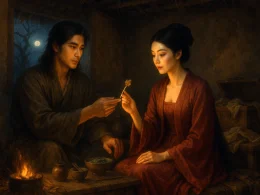At dusk with eastern shore in view,
I stroll but know not where to go.
Tree on tree tinted with autumn hue,
Hill on hill steeped in sunset glow.
The shepherd drives his herd homebound;
The hunter loads his horse with game .
There is no connoisseur around;
I can but sing of hermits' name.
Original Poem
「野望」
王绩
东皋薄暮望,徙倚欲何依。
树树皆秋色,山山唯落晖。
牧人驱犊返,猎马带禽归。
相顾无相识,长歌怀采薇。
Interpretation
Composed during the early Tang Dynasty after Wang Ji's retirement to countryside seclusion, this poem stands as a quintessential work of pastoral poetry. Viewing autumn scenery from Eastern Hill, the poet projects his solitude onto the landscape, blending lyrical description with profound emotion to express his detachment from society and yearning for reclusive living.
First Couplet: "东皋薄暮望,徙倚欲何依。"
Dōng gāo bó mù wàng, xǐ yǐ yù hé yī.
At dusk from Eastern Hill I gaze around, Wandering aimless - where may solace be found?
The opening establishes the poet's contemplative stance with the pivotal verb "gaze" (望). His restless pacing ("wandering aimless") and unanswered question ("where may solace") reveal profound loneliness as twilight descends both literally and metaphorically on his life.
Second Couplet: "树树皆秋色,山山唯落晖。"
Shù shù jiē qiū sè, shān shān wéi luò huī.
Every tree wears autumn's dying hue, Each hill drowns in sunset's golden view.
The parallel structure ("every tree"/"each hill") creates a panoramic view of the autumn landscape. The "dying hue" of foliage and "drowning" hills in sunset light reflect the poet's own melancholy, as nature's transitions mirror his spiritual state.
Third Couplet: "牧人驱犊返,猎马带禽归。"
Mù rén qū dú fǎn, liè mǎ dài qín guī.
Herdsmen drive calves homeward bound, Hunters return with game they've found.
These lively scenes of villagers returning contrast sharply with the poet's rootlessness. The repeated homeward movement ("return"/"homeward") emphasizes what the solitary observer lacks - a place of belonging in this pastoral world.
Fourth Couplet: "相顾无相识,长歌怀采薇。"
Xiāng gù wú xiāng shí, cháng gē huái cǎi wēi.
We glance but share no knowing gaze - Singing aloud, I recall hermits of ancient days.
The conclusion crystallizes the poet's alienation ("no knowing gaze") and spiritual refuge in antiquity. The "hermits of ancient days" reference the noble recluses in the Book of Songs who foraged wild ferns (采薇) to maintain their integrity, becoming Wang Ji's idealized counterparts.
Holistic Appreciation
The poem follows a classical four-part structure—introduction, development, transition, and conclusion—progressing seamlessly from solitary contemplation to scenic depiction, then to human affairs, before culminating in lyrical reflection. Through expansive wilderness and vignettes of daily life bathed in twilight, the poet conveys a profound loneliness out of step with his era, while expressing yearning for a reclusive life of purity.
With unadorned language free of artifice, the poem breaks from the ornate style of the Six Dynasties period, embodying the early Tang aesthetic shift toward clarity and concision. As one of the "Four Great Poets of Early Tang," Wang Ji often echoes the lyrical spirit of the Wei-Jin era, yet this work particularly radiates quiet restraint—its subtlety revealing depth, its emotions lingering long after reading.
Artistic Merits
The poem masterfully blends scene and emotion, using layered natural descriptions to mirror the poet's solitude and contemplation. Its diction is understated yet remarkably vivid—phrases like "every tree tinged with autumn" and "each peak steeped in sunset" capture the season's serenity with ethereal clarity. The conclusion employs subtle allusion through the image of "gathering ferns," conveying the poet's ideals with restrained elegance and profound resonance.
Insights
Though framed by autumn scenery, the poem's essence lies in its exploration of the solitary soul's search for meaning, alienation from worldly affairs, and aspiration toward moral purity. It reminds us that in an clamorous world, while most follow conventional paths, the thinker's vigilance and resolve shine with rare brilliance. This very quality of introspective aloofness allows the poet's voice to transcend time, offering later generations both aesthetic appreciation and philosophical kinship.
Poem translator
Xu Yuanchong (许渊冲)
About the poet
Wang Ji (王绩, c. 589–644), a native of present-day Hejin, Shanxi, was a seminal recluse-poet of the early Tang dynasty. His poetry broke from the ornate Six Dynasties style, bridging Tao Yuanming's pastoral tradition with Wang Wei-Meng Haoran's landscape school. Characterized by unadorned language, his works predominantly celebrate wine and rural idylls.












